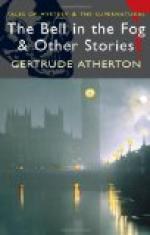However, Weigall’s affection for his friend was too deep to companion with tranquillity in the present state of doubt, and, instead of going to bed early with the other men, he determined to walk until ready for sleep. He went down to the river and followed the path through the woods. There was no moon, but the stars sprinkled their cold light upon the pretty belt of water flowing placidly past wood and ruin, between green masses of overhanging rocks or sloping banks tangled with tree and shrub, leaping occasionally over stones with the harsh notes of an angry scold, to recover its equanimity the moment the way was clear again.
It was very dark in the depths where Weigall trod. He smiled as he recalled a remark of Gifford’s: “An English wood is like a good many other things in life—very promising at a distance, but a hollow mockery when you get within. You see daylight on both sides, and the sun freckles the very bracken. Our woods need the night to make them seem what they ought to be—what they once were, before our ancestors’ descendants demanded so much more money, in these so much more various days.”
Weigall strolled along, smoking, and thinking of his friend, his pranks—many of which had done more credit to his imagination than this—and recalling conversations that had lasted the night through. Just before the end of the London season they had walked the streets one hot night after a party, discussing the various theories of the soul’s destiny. That afternoon they had met at the coffin of a college friend whose mind had been a blank for the past three years. Some months previously they had called at the asylum to see him. His expression had been senile, his face imprinted with the record of debauchery. In death the face was placid, intelligent, without ignoble lineation—the face of the man they had known at college. Weigall and Gifford had had no time to comment there, and the afternoon and evening were full; but, coming forth from the house of festivity together, they had reverted almost at once to the topic.
“I cherish the theory,” Gifford had said, “that the soul sometimes lingers in the body after death. During madness, of course, it is an impotent prisoner, albeit a conscious one. Fancy its agony, and its horror! What more natural than that, when the life-spark goes out, the tortured soul should take possession of the vacant skull and triumph once more for a few hours while old friends look their last? It has had time to repent while compelled to crouch and behold the result of its work, and it has shrived itself into a state of comparative purity. If I had my way, I should stay inside my bones until the coffin had gone into its niche, that I might obviate for my poor old comrade the tragic impersonality of death. And I should like to see justice done to it, as it were—to see it lowered among its ancestors with the ceremony and solemnity that are its due. I am afraid that if I dissevered myself too quickly, I should yield to curiosity and hasten to investigate the mysteries of space.”




